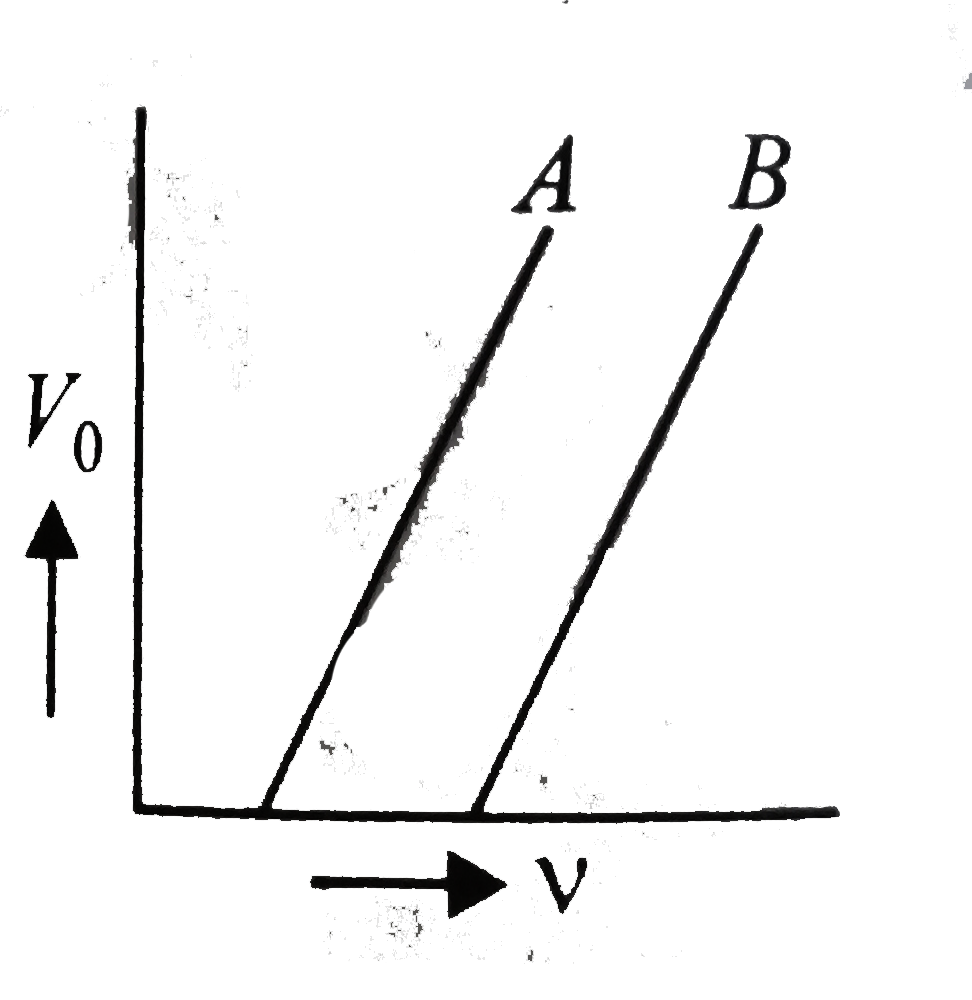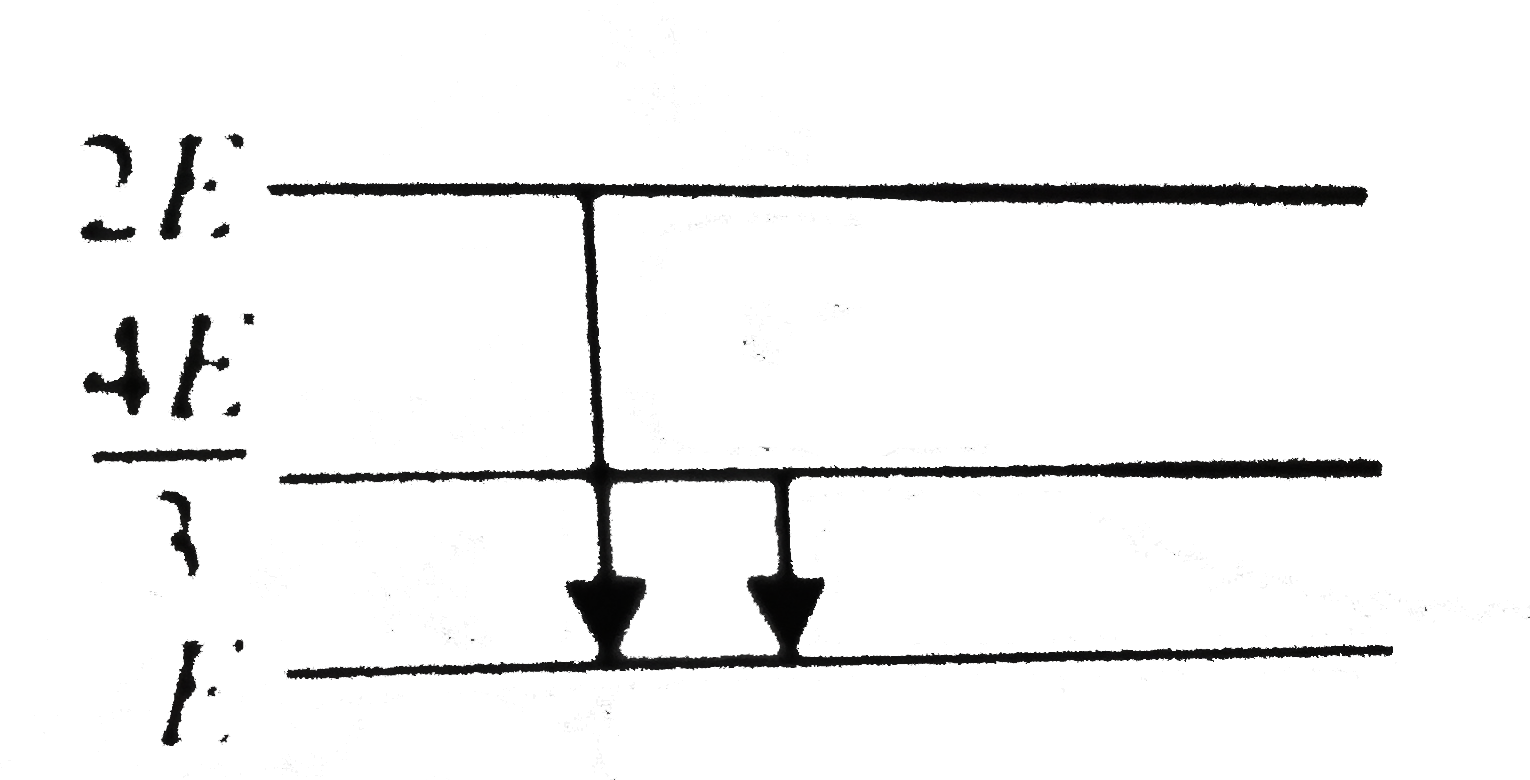The emission of electrons from a metal surface exposed rto light radaition of appropriate wavelength is called photoelectric effect .The emmited electron are called photo=-weklectron work function of threshold energy may be defined as the minimum amount of energy required to ejected electron from a most surface .According to Einstein
Maximum kinetic energy of ejected electron = Absorbed energy - Work function
12mv2max=h(v)−h(vn)=hv[1λ−1λn]
Where vn and λ0 are thereshold frequency and threshold wavelength respectively
Sopping potential : it is the miximum potential at which the photoelectric current becomes zero if V0 is the stopping potential eV0=h(v−v0)
In the photoelectric currect effect the shape of strainght line graph between stopping potential (V0) and frequency of incident light (V) gves
![The emission of electrons from a metal surface exposed rto light radaition of appropriate wavelength is called photoelectric effect .The emmited electron are called photo=-weklectron work function of threshold energy may be defined as the minimum amount of energy required to ejected electron from a most surface .According to Einstein Maximum kinetic energy of ejected electron = Absorbed energy - Work function (1)/(2) mv(max)^(2) = h(v) - h(v(n)) = hv [(1)/(lambda) - (1)/(lambda(n))] Where v(n) and lambda(0) are thereshold frequency and threshold wavelength respectively Sopping potential : it is the miximum potential at which the photoelectric current becomes zero if V(0) is the stopping potential eV(0) = h(v- v(0)) In the photoelectric currect effect the shape of strainght line graph between stopping potential (V(0)) and frequency of incident light (V) gves](https://d10lpgp6xz60nq.cloudfront.net/physics_images/V_PHY_CHM_P1_C04_E01_094_Q01.png)
charge on electron
work function of emitter
planck's constant
ratio of plank's constant to charge on electron
The correct Answer is:D
Step by step video & image solution for The emission of electrons from a metal surface exposed rto light radaition of appropriate wavelength is called photoelectric effect .The emmited electron are called photo=-weklectron work function of threshold energy may be defined as the minimum amount of energy required to ejected electron from a most surface .According to Einstein Maximum kinetic energy of ejected electron = Absorbed energy - Work function (1)/(2) mv_(max)^(2) = h(v) - h(v_(n)) = hv [(1)/(lambda) - (1)/(lambda_(n))] Where v_(n) and lambda_(0) are thereshold frequency and threshold wavelength respectively Sopping potential : it is the miximum potential at which the photoelectric current becomes zero if V_(0) is the stopping potential eV_(0) = h(v- v_(0)) In the photoelectric currect effect the shape of strainght line graph between stopping potential (V_(0)) and frequency of incident light (V) gves by Chemistry experts to help you in doubts & scoring excellent marks in Class 11 exams.
Updated on:21/07/2023Topper's Solved these Questions
- ATOMIC STRUCTUREBOOK - CENGAGE CHEMISTRY ENGLISHCHAPTER - ATOMIC STRUCTUREEXERCISE - Exercises Multiple Correct
45 Videos
- ATOMIC STRUCTUREBOOK - CENGAGE CHEMISTRY ENGLISHCHAPTER - ATOMIC STRUCTUREEXERCISE - Exercises Single Correct
127 Videos
- ATOMIC STRUCTUREBOOK - CENGAGE CHEMISTRY ENGLISHCHAPTER - ATOMIC STRUCTUREEXERCISE - Exercises (Subjective)
52 Videos
- APPENDIX - INORGANIC VOLUME 1BOOK - CENGAGE CHEMISTRY ENGLISHCHAPTER - APPENDIX - INORGANIC VOLUME 1EXERCISE - chapter-7 Single correct answer
1 Videos
- CHEMICAL BONDING AND MOLECULAR STRUCTUREBOOK - CENGAGE CHEMISTRY ENGLISHCHAPTER - CHEMICAL BONDING AND MOLECULAR STRUCTUREEXERCISE - Archives Subjective
15 Videos
Similar Questions
The emission of electrons from a metal surface exposed rto light radaition of appropriate wavelength is called photoelectroic effect .The emmited electron are called photo=-weklectron work function of threshold energy may be defined as the minimum amount of energy required to ejercted electron from a most surface .According to Einstein
Maximum kinetic energy of ejected electron = Aborbed energy - Work function
12mv2max=h(v)−h(vn)=hv[1λ−01λn]
Where vn and λ0 are thereshold frequency and threshold wavelength respectively
Sopping potential : it is the miximum potential at which the photoelectric current becomes zero if V0 is the stopping potential eV0=h(v−v0)
Which graph is correct ?
View SolutionThe emission of electrons from a metal surface exposed rto light radaition of appropriate wavelength is called photoelectroic effect .The emmited electron are called photo=-weklectron work function of threshold energy may be defined as the minimum amount of energy required to ejercted electron from a most surface .According to Einstein
Maximum kinetic energy of ejected electron = Aborbed energy - Work function
12mv2max=h(v)−h(vn)=hv[1λ−01λn]
Where vn and λ0 are thereshold frequency and threshold wavelength respectively
Sopping potential : it is the miximum potential at which the photoelectric current becomes zero if V0 is the stopping potential eV0=h(v−v0)
Whaich of the following is the graph between the frequency (V) of the incident radiation and the stopping potential (v) ?
View SolutionThe emission of electrons from a metal surface exposed rto light radaition of appropriate wavelength is called photoelectroic effect .The emmited electron are called photo=-weklectron work function of threshold energy may be defined as the minimum amount of energy required to ejercted electron from a most surface .According to Einstein
Maximum kinetic energy of ejected electron = Aborbed energy - Work function
12mv2max=h(v)−h(vn)=hv[1λ−01λn]
Where vn and λ0 are thereshold frequency and threshold wavelength respectively
Sopping potential : it is the miximum potential at which the photoelectric current becomes zero if V0 is the stopping potential eV0=h(v−v0)
The stopping potential as a function on electron frtequency is plotted for two photoelectric surface A abd B The graph show that the work function of A is

View SolutionThe emission of electrons from a metal surface exposed rto light radaition of appropriate wavelength is called photoelectroic effect .The emmited electron are called photo=-weklectron work function of threshold energy may be defined as the minimum amount of energy required to ejercted electron from a most surface .According to Einstein
Maximum kinetic energy of ejected electron = Aborbed energy - Work function
12mv2max=h(v)−h(vn)=hv[1λ−01λn]
Where vn and λ0 are thereshold frequency and threshold wavelength respectively
Sopping potential : it is the miximum potential at which the photoelectric current becomes zero if V0 is the stopping potential eV0=h(v−v0)
The folloeing figure indicates the energy livels of a certain atom .When the system moves from 2E level to E lvel a photon of wavelength λ is emitted .The wavelength of the photon produced during the transition from level 4E/3 to level E is

View SolutionFill in the blanks in the following sentences with appropriate words:
The minimum amount of energy required to emit an electron from a metal surface is called ________ .
View SolutionIn photoelectric emission, the energy of the emitted electron is
View SolutionIf the threshold wavelength (λ0) for ejection of electron from metal is 330 nm, then work function for the photoelectric emission is:
View SolutionIf the threshold wavelength (λ0) for ejection of electron from metal is 350nmthen work function for the photoelectric emission is
View SolutionThe photo-electrons emitted from a surface of sodium metal are such that
View SolutionThe photo-electrons emitted from a surface of sodium metal are such that
View Solution
